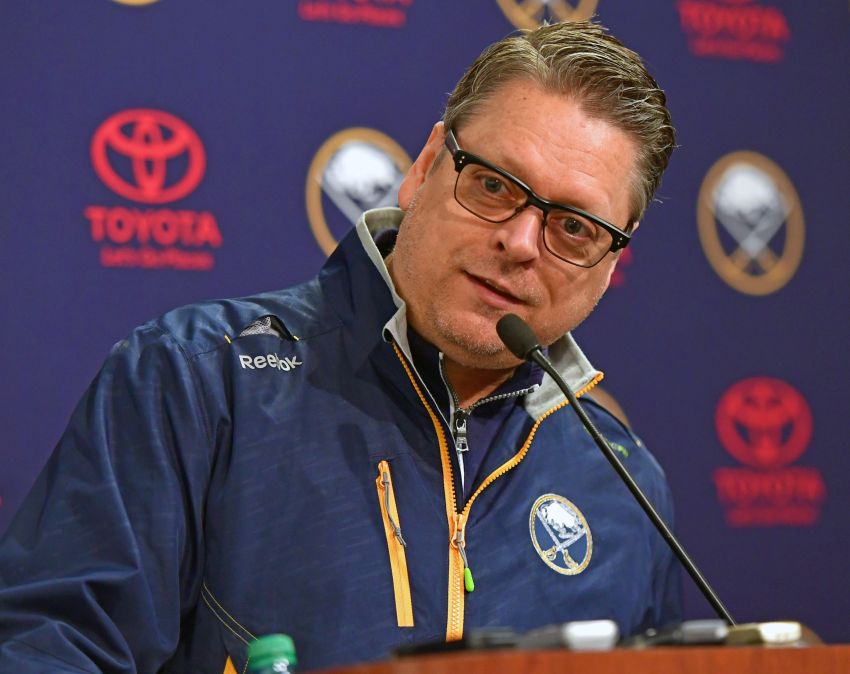BUFFALO – Right now, just days after the Sabres ended another disappointing season in last place, Dan Bylsma is still his coach, general manager Tim Murray said.
“He’s my coach today, I’m the general manager today,” Murray said Wednesday during his end-of-season news conference inside KeyBank Center. “There’s a review top to bottom. I have to meet with ownership next week in Florida. I’m sure I’ll be reviewed, I’m sure I’m being reviewed right now, as I should be.”
What does that mean? When Murray was pressed if he could say definitively if Bylsma would be coach next season, he replied, “I guess I can.”
“In this game, what I learned is there’s not pats on the back,” Murray said. “If you have a contract, that’s your pat on the back, that’s your term of employment. He has three years left on his deal. I have three years left on my deal. I’m the general manager today. He’s the coach today.
“I haven’t had any thoughts of firing him up to this point, and the reason I always say today is something can happen tomorrow.”
As Murray said, he and Bylsma are still subject to owner Terry Pegula’s review. Perhaps that’s why he wasn’t totally concrete in sticking with Bylsma.
Whatever the case, Murray hardly gave Bylsma a ringing endorsement. Clearly, he wasn’t pleased with a 78-point season filled with regression.
Murray shouldered blame, too, saying he was “willing to take the knife.” He started his 30-minute question-and-answer session by saying from “top to bottom in the organization, we understand it was a very disappointing season.”
“I stand here and take full responsibility for our position, our standings and how it finished,” he said.
Murray acknowledged the Sabres’ rebuild has stalled. Next season, he said, they must make the playoffs.
“Make-or-break,” he said.
So what must change? In holding exit interviews with players, Murray said he learned the Sabres must “be clearer in our message.”
“The players want black and white,” he said. “That comes to team rules, that comes to team schedules, that comes to team style of play, that comes to role on your team, that comes to being a Buffalo Sabre. That doesn’t just fall on the coach – it also falls on the coach – but it also falls on me, it falls on the players.”
That means becoming “more demanding in every area,” Murray said.
“We have to be clearer on the consequence of breaking the rules, and it goes down the line from rules to style of play, how we practice,” he said. “We have to make more demands. So I have to make more demands of Dan. Dan has to make more demands of players. I personally have to make more demands of myself.”
What falls on the coaches? A lot, of course.
Murray believes the Sabres worry about the opposition too much.
“We should worry about what’s going on in this building,” he said.
For example, instead of hunkering down and watching video for hours, he wants the coaches to establish better relationships.
“Maybe they could put a coffee in their hand once in a while and do two hours of video instead of three and get out and get to know our players and talk to our players,” he said. “It’s about coaching individuals a little more and coaching system a little less.”
Murray wouldn’t delve into what exactly went wrong during the Sabres’ 33-37-12 campaign, only saying injuries – the team’s top offensive threats, most notably center Jack Eichel, all missed chunks of time – played a role.
“We’re not at a position – and I haven’t put us in a position – that we can withstand that yet,” he said. “I hope to one day be able to do that, and develop and create enough depth that we can do that, but I haven’t done that to this point.”
Not surprisingly, Murray said his top offseason priority will be strengthening the team’s defense.
“I’m trying not to (expletive) on the defensemen we have here,” he said.
Still, Murray knows the group was the team’s weakest spot. The Sabres gave up an NHL-high 34.3 shots a game and struggled to score even-strength goals because of an awful transition game.
“We have to be able to play a transition game,” Murray said. “We can’t have 90 percent of our goals coming off of hard work and the cycle, and that’s where they all came from. So this game is about speed and transition and we failed there. That’s on all of us.”


